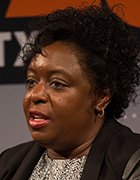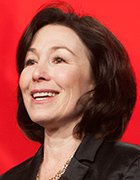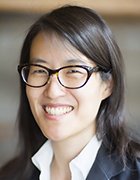
olly - Fotolia
Top 10 most influential women in technology
While there are still fewer women than men in the science and technology industries today, the gap is closing. Here are some top women in tech of note.
When analyzing statistics and trends of women working in technology, the research shows gaps in STEM education, retention, ethnicity and race, culture issues and leadership position gaps. According to a 2025 study by the Women in Tech Network, women make up 35% of employees in STEM in the U.S., while 65% of tech recruiters acknowledge bias in hiring.
While much work is left to do, we are beginning to see more women in tech jobs.
Here are ten of the top women in tech today, many of whom are potent activists working for greater diversity and representation in their fields.
1. Sheridan Ash, founder and CEO of Tech She Can
Sheridan Ash is the founder of Tech She Can, a UK-based initiative dedicated to inspiring and empowering women to pursue careers in technology. The charity works with industry, government and schools to help drive and support women into tech roles by fighting for change and developing stronger education for children.
In 2024, 500,000 children have used Tech She Can online resources, while 440 girls have had the opportunity to experience an immersive career insight day.
Ash told Computer Weekly that during her time at PwC, she wondered, "What was going wrong? Why was it so predominantly male?"
In 2022, Ash was named one of Computer Weekly's most influential women in UK tech and recognized by Forward Ladies as Businesswoman of the Year and Social Impact Leader of the Year. In 2024, she was named the UK's most influential woman in tech.
2. Kimberly Bryant, founder of Black Girls Code
Kimberly Bryant excelled at science and mathematics as a child and earned a scholarship to Vanderbilt University. She obtained a Bachelor of Engineering degree in electrical engineering with minors in mathematics and computer science there.
Bryant took on technical leadership roles for over two decades in several pharmaceutical and biotech companies, including Novartis and Merck.
It wasn't until her daughter showed an interest in computer science that Bryant realized there was still a lack of Black women in the science, technology, engineering and math professions. This gap wasn't due to a lack of interest -- it was due to a lack of access and exposure to STEM topics.
Bryant founded Black Girls Code in 2011, a San Francisco nonprofit that exposes girls of color ages 7 to 17 to STEM subjects. Here, girls can learn in-demand skills as they think about what they want to be when they grow up. The organization aims to teach 1 million Black girls to code by 2040. Today, the organization has 16 chapters across the U.S and one in Johannesburg, South Africa.
2. Safra Catz, CEO of Oracle
Safra Catz immigrated to the U.S. from Israel at age 6. She earned a bachelor's degree from the University of Pennsylvania's Wharton School and her Juris Doctor from Penn Law.
Catz was a banker at Donaldson, Lufkin & Jenrette, working her way through the ranks to become the firm's managing director and senior vice president. In 1999, Catz joined Oracle as its senior vice president. She joined the company's board of directors in 2001 and was named president in 2004.
Under Catz's direction, Oracle initiated over 130 acquisitions and mergers over the next decade. The most well-known of these acquisitions was direct rival PeopleSoft, which Oracle acquired in 2004 for $10.3 billion.
In 2014, Catz became co-CEO of Oracle with Mark Hurd. After Hurd died in 2019, she became the sole CEO. She also teaches accounting at the Stanford School of Business and was elected to the board of directors of Walt Disney Co. in 2017.
4. Kate Crawford, co-founder of New York University's AI Now Institute
Kate Crawford embarked on a career exploring the sociopolitical implications and applications of artificial intelligence after earning her Ph.D. from the University of Sydney.
In her research, Crawford seeks to understand the benefits and dangers of AI and machine learning in the broader context of history, politics, labor, the environment and other sectors. Crawford advocates for mindful and respectful AI development. Her work examines how those technologies could potentially lead to bias, labor and supply chain disruptions, economic impacts due to automation, and privacy violations and curtailment of rights from increased surveillance.
Crawford's work has been featured in Nature, Science, The New York Times and The Atlantic. Her insight has led to multiple speaking engagements and advisory roles to policymakers at the United Nations and the White House. Crawford’s project with artist Vladan Joler titled Anatomy of an AI System won the Beazley Design of the Year Award and is on permanent display in New York at the Museum of Modern Art.
Crawford co-founded New York University's AI Now Institute in 2017, the first university institute dedicated to researching the social impact of AI and the first women-led and founded AI institute. The institute aims to change how researchers look at AI and expand their interpretation of it from a technical standpoint to include history, sociology and law to inform their development decisions.
Crawford's book, Atlas of AI: Power, Politics, and the Planetary Costs of Artificial Intelligence, has received recognition from entities such as the Financial Times, the New Yorker, New York Review of Books and Science.
In 2023, Crawford participated in a collaborative research project, Calculating Empires: A Genealogy of Technology and Power Since 1500.
5. Amy Hood, executive vice president and chief financial officer of Microsoft
Amy Hood earned her bachelor's degree in economics from Duke University and her MBA from Harvard University.

As the first female CFO in Microsoft history, she now works to increase the big tech company’s long-growth while promoting a culture of equality. Hood is focused on bringing additional Black-owned partners and suppliers into Microsoft’s network. She is a big proponent of equality for women in large leadership roles and speaks regularly at events such as Fortune's Most Powerful Women Summit.
Hood is responsible for leading Microsoft's worldwide financial organizations, including managing tax planning, acquisitions, audits, accounting and investor relations. She was recognized for leading Microsoft's largest corporate initiatives, including transiting to the company's Office 365 service and acquisitions of LinkedIn, Skype and Yammer. Before becoming CFO in 2013, Hood held various roles in Microsoft's server and tools business along with the corporate financial division. She is credited with helping Microsoft engineer nearly 57 deals, including one of its largest – the $7.6 billion GitHub acquisition in 2018.
Hood’s leadership skills earned her a spot on Forbes' list of The World’s 100 Most Powerful Women, where she ranked #63 in 2013 and moved up to #28 in 2022. Hood has also served on 3M’s board of directors since 2017.
6. Fei-Fei Li, co-director of Stanford's Human-Centered AI Institute
Fei-Fei Li was born in Beijing, China, and moved to the U.S. at age 16. She graduated from Princeton with a Bachelor of Arts degree in physics, and from the California Institute of Technology with a Ph.D. in computer science.
 Fei-Fei Li
Fei-Fei Li
After graduating, Li taught engineering and computer science courses at the University of Illinois and Princeton. She then joined the staff at Stanford in 2009, where she still teaches as a fully tenured professor. Li served as the director of Stanford's AI Lab from 2014 to 2018. She currently holds the title of co-director of Stanford's Human-Centered AI Institute.
Li's research focuses on cognitive and computational neuroscience, and machine learning to improve AI image recognition ability. This research led her to take a sabbatical from Stanford from January 2017 to September 2018, when she served as vice president of Google and chief scientist of AI and machine learning at Google Cloud.
Li also founded AI4ALL along with her Ph.D. student, Olga Russakovsky in 2017. AI4ALL is a nonprofit aimed at increasing diversity in the AI sphere through education, recruitment, mentoring and training students in historically underserved communities. AI4ALL has partnered with professionals from organizations such as Stanford, Carnegie Mellon, Black Girls Code and Girls Who Code. Today, it operates summer programs in 16 locations across the U.S.
In 2023, Li published her memoir, The Worlds I See: Curiosity, Exploration, and Discovery at the Dawn of AI.
Learn more about Li's thoughts on developing ethical AI here.
7. Ellen Pao, co-founder and CEO of Project Include
Ellen Pao learned how to code at age 10 from her mother -- a computer engineer at the University of Pennsylvania. Pao went on to graduate with a Bachelor of Science in Engineering in electrical engineering and a certificate in public policy from Princeton University. She also earned a Juris Doctor from Harvard Law and an MBA from Harvard Business School.
After working for several Silicon Valley companies -- including WebTV and BEA Systems -- Pao became the technical chief of staff at Kleiner Perkins Caufield & Byers, a San Francisco venture capital firm. She ended up suing the company for bias and gender discrimination.
In 2013, Pao became Reddit's head of business development and strategic partnerships, then interim CEO in 2014. Pao is an advocate for women's rights and transforming corporate culture, and she banned the use of "revenge porn" and unauthorized nude photos on Reddit. This move inspired other social media platforms to institute similar policies.
Pao later resigned from Reddit and founded Project Include with several other women in the tech industry. The group's mission is to address and prevent sexism and gender discrimination in Silicon Valley, and to improve diversity and inclusion within tech companies.
8. Reshma Saujani, founder and CEO of Girls Who Code
Reshma Saujani graduated from the University of Illinois with a bachelor's degree in political science and speech communication. From there, she received her Master of Public Policy degree from Harvard's Kennedy School of Government, and her Juris Doctor from Yale Law School.
Saujani became the first Indian-American woman to run for U.S. Congress in 2010, when she campaigned for a New York House seat. During the race, she ran the first political campaign using tools such as Square to receive donations. And while visiting area schools during the race, she saw firsthand the gender gap in computer classes.
In 2012, Saujani founded Girls Who Code to address that gender gap in the tech workforce, with programs for grades 3 all the way through college. The organization offers summer immersion and campus programs, online resources, books, after-school clubs and college alumni programs. To date, the organization has served more than 450,000 girls, approximately half of whom are from underserved communities made up of Black, Latina and low-income girls.
In 2017, Saujani published her book, Girls Who Code: Learn to Code and Change the World, promoting the tenets of her organization. Saujani also wrote published books Brave, Not Perfect and Pay Up: The Future of Women and Work.
9. Gwynne Shotwell, president and COO of SpaceX
Gwynne Shotwell earned Bachelor of Science and Master of Science degrees in mechanical engineering and applied mathematics from Northwestern University. After graduation, Shotwell enrolled in the Chrysler Corp.'s management training program to begin a career in the automotive industry. But she quickly changed course to work on military space research contracts with Aerospace Corp. in El Segundo, Calif. There, she became the chief engineer of an MLV-class satellite program, where she researched and developed policies for commercial space exploration for the Federal Aviation Administration and NASA.
Her interest in space exploration made her a top candidate for SpaceX in 2002. SpaceX brought her on as its 11th employee and vice president of business development. Since then, Shotwell has become the company's president and COO, making her responsible for day-to-day operations and company outreach and development.
SpaceX was the first private company to put a commercial satellite into orbit and the first private company to send humans into orbit and to the International Space Station. It is also the world's largest commercial satellite constellation operator.
Shotwell has been inducted into the Women in Technology International Hall of Fame and was named one of Time magazine's 100 most influential people in the world in 2020.
10. Navrina Singh, CEO and founder of Credo AI
Navrina Singh is the CEO and founder of Credo AI and a pioneer in responsible and ethical AI. She received her master's in electrical and computer engineering from the University of Wisconsin-Madison and her MBA from the Marshall School of Business at the University of Southern California. Singh is a young global leader with the World Economic Forum.
Singh holds many leadership roles across Microsoft and Qualcomm and is a member of the U.S. Department of Commerce National Artificial Intelligence Advisory Committee, which advises the President and the National AI Initiative Office.
Credo AI provides tools and frameworks to help organizations manage the risks associated with AI while ensuring that these systems are deployed fairly, transparently and ethically.
Women of the past
Celebrating the achievements of women in STEM throughout history who have cemented themselves as role models for women entering the industry today is important.
- Marie Curie. A physicist and chemist, Curie was the first woman to win a Nobel Prize for her research on radiation. Her research led to medical advancements like radiation therapy for cancer treatment, and she laid the foundation for nuclear science research.
- Margaret Hamilton. Hamilton and her team at the MIT Instrumentation Laboratory developed the software that guided NASA's Apollo 11 mission to the moon. Her work on the mission helped establish software engineering as a formal discipline.
- Katherine Johnson. Johnson was a mathematician, often called a "human computer," who calculated the trajectories for the first moon landing and John Glenn's first orbital flight in 1962. In 2015, President Obama awarded Johnson the Presidential Medal of Freedom, recognizing her contributions to the space program.
- Hedy Lamarr. While Lamarr rose to fame as a Hollywood actress, her innovation and co-invention of frequency-hopping technology became the basis of Bluetooth, GPS and Wi-Fi. Lamaar's invention helped to enable secure communication to guide torpedoes to targets during World War II.
- Ada Lovelace. Lovelace is often called 'the first computer programmer' and is widely known for her work on Charles Babbage's proposed mechanical general-purpose computer. Lovelace wrote an algorithm for the machine to calculate Bernoulli numbers, which is widely regarded as the first algorithm intended to be executed by a machine.
- Dr Wangarĩ Maathai. Dr Maathai pioneered environmental activism and was the first African woman to win the Nobel Peace Prize. In 1977, Maathai founded the Green Belt Movement, an organization dedicated to conservation and women's rights.
Rosa Heaton is a content manager for the Learning Content group at Informa TechTarget.
Amanda Hetler is a senior editor and writer for WhatIs where she writes technology explainer articles and works with freelancers.
 Kimberly Bryant
Kimberly Bryant
 Safra Catz
Safra Catz
 Kate Crawford
Kate Crawford
 Ellen Pao
Ellen Pao
 Reshma Saujani
Reshma Saujani
 Gwynne Shotwell
Gwynne Shotwell





